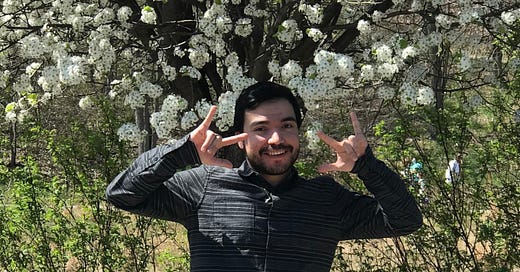#463: Americanizing Lengua
Articles on learning English, caregivers, crushes, and breast reductions
Have you noticed the trend? As the election nears, I’m seeing an increase in articles on politics and current events. This is natural, and it’s not a bad thing. But Article Club has always striven to bring you thought-provoking articles from a variety of publications in order to expand your empathy, not necessarily to confirm your beliefs.
That’s why I scoured literary journals again this week in my quest to find you the best articles on race, education, and culture. I’m pleased with what I found. You’ll read pieces from Gulf Coast, Salmagundi, and The Journal of The Ohio State University.
As always, I hope you read today’s lead article, “Americanizing Lengua,” by Moisés R. Delgado. It’s a beautiful profile of the author’s father, an immigrant from Mexico who decides to learn English after previously having no interest. With careful prose, Mr. Delgado is able to share his father’s story, as well as his dreams, in a touching way.
If you’re looking for something different, I’ve included three other pieces for you in today’s issue. They’re about:
Hope you enjoy this week’s articles. As always, if a piece hits you, let me know. I’d love to hear from you. Or if you prefer, show your support by becoming a paid subscriber (like Phillip!). I would be very grateful.
1️⃣ Americanizing Lengua
Moisés R. Delgado: “There was a lot of walking when my dad crossed the border. And again more walking the second time he crossed. Both times must have been relatively uneventful because my dad doesn’t speak much about them. Or maybe he doesn’t want to. They happened is all he tells me. It was the third time he crossed into the US that is most memorable. He spent half a night at the bottom of a well. It was maddening to find black beneath him, black on the walls, and black above him where, if not the moon, there should have been at least one star to guide him but there wasn’t. “Pude haber muerto,” he says, and no one would have known but the coyote and the men and women that had been travelling with him, all too desperate to find shade from the merciless desert sun and moon to do a headcount.”
By Moisés R. Delgado • Gulf Coast • 10 min • Gift Link
2️⃣ The Care Giver
Martha Bayles: They sent their best care giver, I have no doubt. But as I opened the front door, I knew they had sent the wrong one for my mother. She was black. Tall and elderly with a short bouffant hairdo, she stood smiling under the portico with a younger woman with neat plaited hair who introduced herself as ‘Ambrozine’s daughter.’ Faking a smile to cover my sinking heart, I turned to the older lady and said, ‘How do you do … Amber?’ The younger woman repeated the name, which makes sense as the feminine of ‘Ambrose’ but at that moment made no sense. Eventually the young woman got it across that her mother, who had come all the way out here from Mattapan to take care of my mother, was named Ambrozine.
“I couldn’t say no on the spot. No matter how compelling my reasons, as a white person I could not simply frown at a black person and say, ‘Sorry, you won’t do.’ Ambrozine was Jamaican, with an accent as colorful and rich as her clothes were colorful and shabby. When she entered the living room, my mother took one look at this person in a plaid skirt and flowered sweater, and shrank back into her armchair. ‘You must be Amber,’ she said with gelid politeness. ‘How do you do?’ ”
By Martha Bayles • Salmagundi • 26 min • Gift Link

3️⃣ Smashing
Samantha Colicchio: “We love our friends first. We set our moods by them, engage in power plays, obsess about what they’re doing when we’re not together. There are no boundaries: we braid each other’s hair, pick bits of food out of each other’s teeth, share beds, share food, share money. Sometimes we kiss each other on the mouth —for boys, or to practice, or just because it feels good.
“In our youth, our girlfriends are our co-conspirators, allies in the lifelong battle to be perceived as beautiful. Our togetherness multiplied our power. It was intoxicating to be in public with other girls, to scoff at the advances of men as though they didn’t feed us enormously, to indulge in conversation with girls whom we thought were less attractive, to secretly harbor feelings of superiority. It was easy to believe that, together, the world would unfurl itself at our feet.”
By Samantha Colicchio • The Journal • 19 min • Gift Link
4️⃣ The Power of a Smaller Breast
Lisa Miller: “In 2023, more than 76,000 American women had elective breast-reduction surgery, a 64 percent increase since 2019, according to the American Society of Plastic Surgeons. The increase is reflected across all age groups, but especially among women under 30, who are enthusiastic consumers of plastic surgery in general, including face- and forehead lifts, procedures favored mostly by women their mothers’ age. Girls younger than 19 represent a small but fast-growing part of the market.
To decide to reduce [one’s breasts], to make them lighter, smaller, easier to carry and cover — more discreet — can be seen as an act of self-love and empowerment, a woman’s prioritization, finally, of her own comfort and independence over what others have traditionally found sexy. Or it can be interpreted as self-loathing, an agreement with a sexist culture that can also regard larger breasts that aren’t youthfully round and upright as repulsive: droopy, flabby, jiggly, hard to contain.”
By Lisa Miller • The New York Times • 14 min • Gift Link
Thank you for reading this week’s issue. Hope you liked it. 😀
To our 9 new subscribers — including Mike, Deborah, Viv, Eli, Sarah, Nicole, Julie, Neelam, Alisha, and Danielle — I hope you find the newsletter a solid addition to your email inbox. Welcome to Article Club. Make yourself at home.
If you appreciate the articles, value our discussions, and in general have come to trust that Article Club will have better things for you to read than your current habit of scrolling the Internet for hours on end, please consider a paid subscription. I am very appreciative of Phillip, our latest paid founding member. Thank you!
If subscribing is not your thing, don’t despair: There are other ways you can support this newsletter. Recommend the newsletter to a friend (thanks Lily!), leave a comment, buy me a coffee, or send me an email. I’d love to hear from you.
On the other hand, if you no longer want to receive this newsletter, please feel free to unsubscribe below. See you next Thursday at 9:10 am PT.






